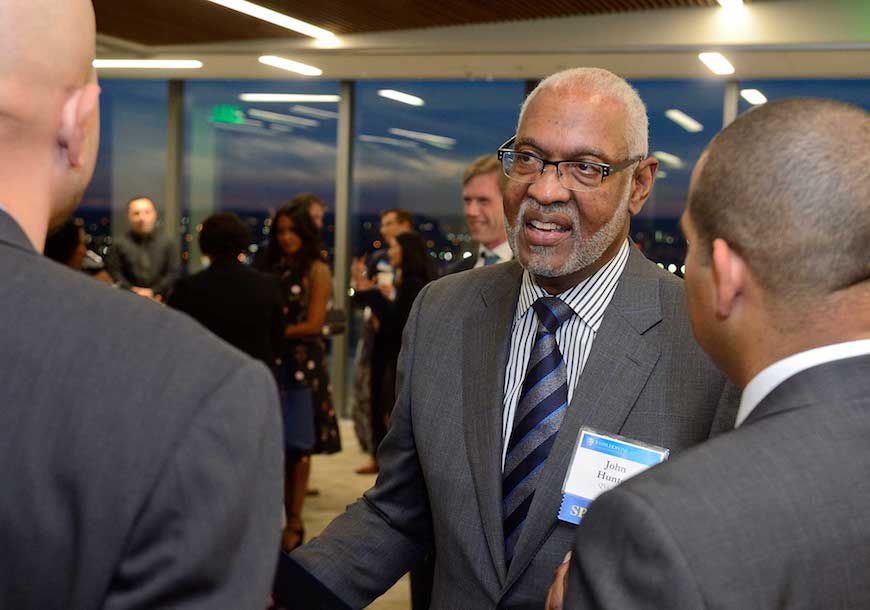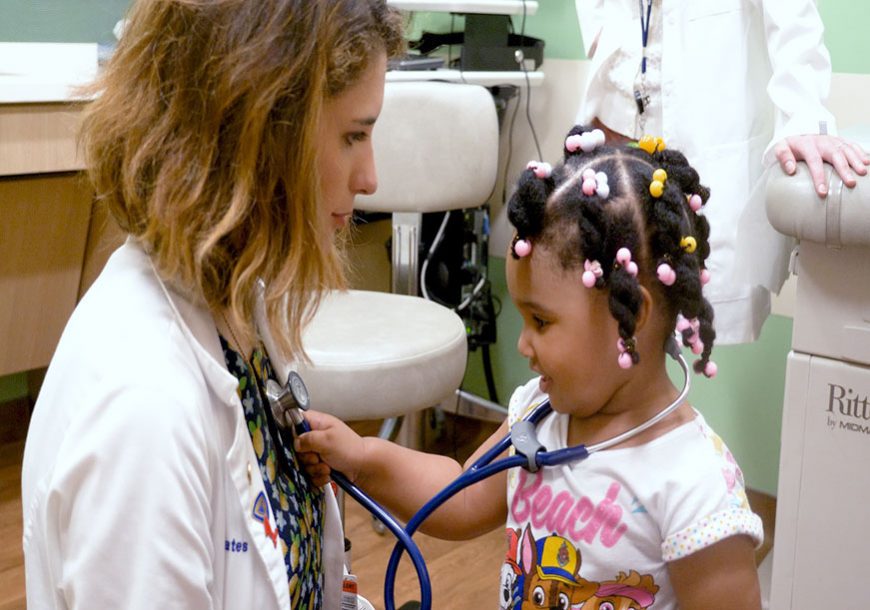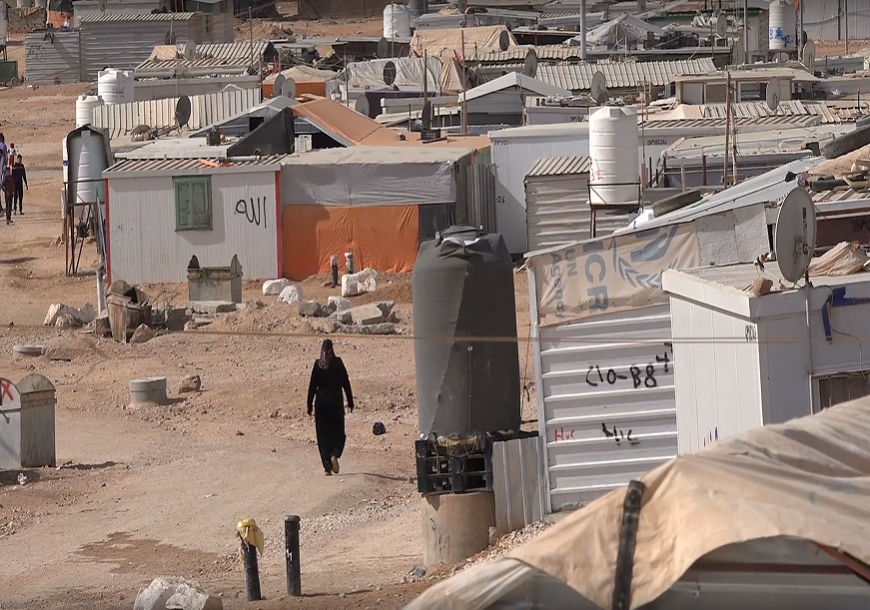Want to Diversify the World’s Boardrooms? Start in the Classroom

One Saturday afternoon in the early 1990s, John Hunter, then a senior vice president for Citibank, volunteered to speak with students in Johns Hopkins’ nascent Leadership Development Program (LDP) for Minority Managers.
“Students were asking questions like, ‘What do I say if I bump into the company president in the hall, and he says hello?” Hunter recalls. “At first I thought, ‘Wow, that’s kind of a mundane question.’ But then I realized the seriousness of the situation — if they were asking me questions this simple, what else don’t they know?”
In partnership with Carey Business School Dean Bernie Ferrari, Hunter helped develop Carey’s Leading a Diverse Society Initiative.
“We believe that a diverse school is positioned best to lead a diverse society. Carey aspires to be a school community that truly embodies the values and characteristics of a global society,” says Ferrari.
The initiative draws from the expertise, professional connections, and financial support of LDP’s alumni to provide enrichment opportunities for underrepresented minority students, supplementing their Carey degree programs.
Hunter, a member of Dean’s Advisory Council at Carey, has long devoted all three of those resources to Johns Hopkins business students. He and his wife have made gifts to support student financial aid, including the establishment of the John and Dolores Hunter Family Scholarship. But in laying the foundation for the Leading a Diverse Society Initiative, Hunter needed to encourage many others, particularly LDP alumni, to do the same thing. He identified a core of former students, several of whom have gone on to become leaders in global board rooms and all levels of government, and reached out to gauge their interest in recruiting students, serving as mentors, and making gifts.
Tina Wilson, Bus ’98 (Cert), ’03 (MBA), is one of the alumni who have made a gift to, or committed to volunteer for, the Leading a Diverse Society Initiative. Wilson credits LDP with helping her transition to civilian professional life after a decorated career in the U.S. Air Force. “I decided to start my own company, and I attribute a lot of that decision to the LDP, which taught me your journey is your journey. Nobody can walk in your shoes — but you have to believe that you can,” Wilson says.
When Wilson learned about the Leading a Diverse Society Initiative, she knew she wanted to make a gift. “To be a meaningful part of discussions about inclusion in business moving forward, you need to provide the next generation some means of financial support,” she says, adding that her own undergraduate and graduate degrees were made possible because of the GI Bill. “If there’s an avenue that can assist someone who doesn’t have the means to attend Hopkins, let’s make it happen.”
“Underrepresented minorities have to have a place at the table, not only to be part of the changes that will advance our society but to lead them,” Hunter says. “It’s important that Johns Hopkins, which has a gravitas in higher education, can produce these kinds of leaders for the world’s businesses.”
Underrepresented minorities have to have a place at the table, not only to be part of the changes that will advance our society but to lead them.”
“Change Can Come, but it Has To Be Nurtured”

As an elementary school student in East Baltimore, Mateen Milan picked up an unusual hobby for kids in his neighborhood: the clarinet. Music might have remained just a hobby for Milan if not for an observant teacher, who encouraged him to enroll in the Tuned-In program, which provides full scholarships to the Peabody Preparatory for talented Baltimore City youth.
At the Prep, Milan blossomed. He switched from clarinet to bassoon and qualified to attend the Baltimore School for the Arts, then earned admission to the Peabody Conservatory as a Baltimore Scholar — a Hopkins-wide program that provides tuition support for high-achieving city public school graduates.
A $500,000 gift from philanthropists Rheda Becker and Robert E. Meyerhoff created the Peabody Diversity Fund to enable more students to follow in Milan’s footsteps. The fund also will address the equally important challenge of attracting underrepresented minorities to the Peabody faculty and staff, providing teacher role models for students and making the Institute accessible to new audiences through outreach programs.
“Change can come, but it has to be nurtured — and we want to help Peabody in its efforts to become more diverse,” says Becker, a Peabody National Advisory Council member. Meyerhoff has long supported higher education diversity initiatives, making the Peabody Diversity Fund a perfect match for the couple’s philanthropic interests.
Among Dean Fred Bronstein’s top priorities for the fund is creating additional full scholarships for the Tuned-In program and to strengthen support for Peabody’s Baltimore Scholars. Bronstein also plans to apply the resources to attract and retain faculty of color through a variety of means, such as Distinguished Visiting Artist appointments and residencies.
Just like you have to give a plant water to grow, students like me need our water. We all need something to help us cultivate our artistic abilities, but also our lives.”
Working Hard to do the Most Good

Johns Hopkins School of Medicine student Marina Horiates was diagnosed with leukemia when she was 2 years old. The subsequent nine months of chemotherapy and treatment introduced her to the people that would inspire her medical career.
“Those doctors were amazing, and they were kind of my superheroes,” Horiates says. “I always said I wanted to grow up and be them specifically.”
When Horiates was considering medical schools, Hopkins was at the top of her list. Being named the Class of 1936 Memorial Scholar and the Alfred DeSanctis, MD, Scholar in the School of Medicine made attending her number one choice possible.
“I’ve had a lot of blessings in my life,” Horiates says. “Going forward, I want to be able to say that I didn’t pick the easy path. I didn’t think only of myself in the decisions that I made in my career. I want to be able to look back and say I worked as hard as I could to do the most good.”
Horiates’ history has continued to inspire her time at Hopkins. As a first year medical student, she worked at the Hopkins Community Clinic, where she uncovered an interest in cardiac surgery.
“I think my perspective and my history helps me to hopefully contribute an important perspective to the team,” she says, adding congenital heart disease has a similar timeline to her childhood illness. “With these kids you can physically go in and, with your hands, put the heart back how it was supposed to be. And these kids can go on to have normal lives.”
Health Care for Refugees

The experience of being personally displaced due to armed conflict opened the eyes of Mohammad Darwish, MD, to the intricacies of responding to large-scale humanitarian crises.
“Addressing only the medical aspect of the problem – as what a physician like me would only be able to do – does not make as big of a difference in people’s suffering as I wish for,” says Darwish, who received his medical degree from Damascus University in 2015.
“That’s because with large-scale disasters come many challenges: the struggle to secure sufficient nutrition and appropriate hygiene, to contain and prevent communicable disease outbreaks, and to be able to efficiently deal with victims of human trafficking, sexual violence, and other human rights violations that accompany these disasters,” according to Darwish, who is one of two Syrian scholarship recipients enrolled in an intensive, 11-month MPH program at the Bloomberg School of Public Health.
Along with an internally displaced population of six million Syrians, five million refugees have left the country since the conflict began there in 2011. Prior to coming to America, Darwish was providing first-responder training through the Palestine Red Crescent Society in support of internally displaced people and refugees in Lebanon.
“The Center for Humanitarian Health worked to create these two refugee scholarships, together with the Bloomberg School of Public Health, in order to allow refugees, and in this case Syrian refugees, to come to further develop their skills, but also more importantly for them, hopefully, to return home and to benefit the people of Syria,” says Paul Spiegel, MD, MPH ’96, who directs the center.
The university also benefits from having such diverse experiences and perspectives among the students, Spiegel says. He adds that the scholarship, which is supported through the Dean’s Strategic Discretionary Fund, will continue next year and will be open to refugees from Syria, South Sudan, Somalia, and Afghanistan.
“I believe that by pursuing a master’s of public health, I can be as beneficial to my fellow humans as I dream to be,” says Darwish, who is currently researching the obstacles facing healthcare workers in Syria, like physical dangers and a lack of supplies, and investigating how refugees are accessing health care.
Darwish says he is not optimistic about fast solutions to the Syrian crisis, but he hopes one day to use his expanded skills and training to rebuild the country’s health care and ethical systems.
“I’m very grateful because John Hopkins is supporting Syria by this scholarship, whereas most of the world turned a blind eye for the Syrian people’s tragedy,” says Darwish. “My heroes are those doctors still working in Syria,” he says, adding that this includes his parents who are also both physicians.